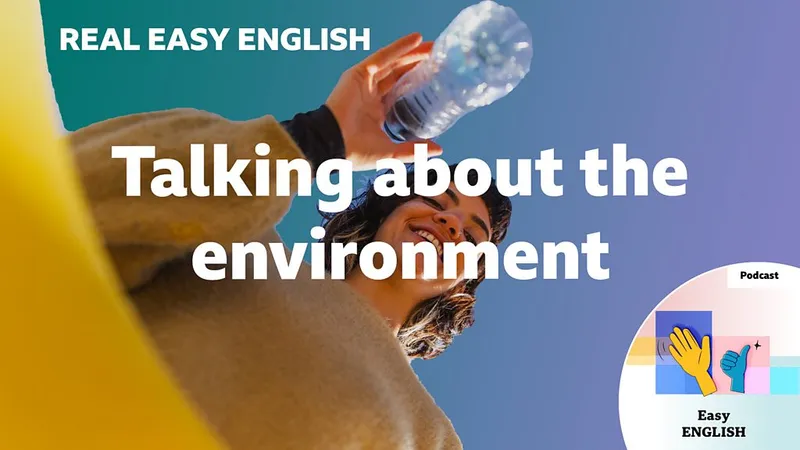Beth Hi, I’m Beth.
Neil And I’m Neil. And this is Real Easy English from BBC Learning English.
Beth In this podcast, we talk about big topics in easy English to help you learn.
Neil You can find all the vocabulary from this episode and read along on our website: bbclearningenglish.com
Beth Hello, Neil. How are you today?
Neil Hi, Beth. I’m fine, thank you. How are you?
Beth I’m good, thank you. I have just got back from holiday and it was very hot! And today, we’re talking about the environment. We’ll talk about climate change and what we are trying to do to help.
Neil OK, Beth, can you explain the phrase climate change, please?
Beth Yes, so climate change is what we call changes to the world’s weather patterns. So, for example, the general temperature, rainfall that kind of thing. And in particular with climate change, we mean changes to the weather that are caused by human activity.
Neil So, Beth, are you worried about climate change?
Beth Yes, definitely. I do think that it’s a big problem. The world is getting hotter or the weather is changing quite a lot. I know that in a lot of countries at the moment in the winter it’s much hotter than it used to be and this affects people. It affects animals and plants, all sorts of things.
Neil And it’s worrying for the future generations, isn’t it? So children and future grandchildren have to live in this world. And what kind of world might it be?
Beth So, Neil, what do you try to do to help climate change?
Neil Well, I ride my bike, whenever I can. I try not to make journeys in the car that I don’t really need to. I use public transport when I can. I also try not to fly, but that’s mainly, to be honest, because I don’t like flying. How about you, Beth? What do you do?
Beth Well, I try to not eat too much meat. I might have something like chicken or fish maybe once or twice a week because I know that animal consumption, so eating meat, does contribute to climate change.
Neil Now, Beth, you told me you are getting solar panels. Is that right?
Beth I did, yeah. So I think we’re going to have twelve put on the top of a house and that will bring our electricity bill down and it helps the environment because it’s using energy from the sun.
Neil Yeah.
Beth So yeah!
Neil That’s a nice eco-friendly plan you have.
Beth It is, yeah. Neil is there anything else that worries you about the environment?
Neil Yes, I’m worried about pollution. The air in cities is very dirty and we live in London and sadly some schools are right next to busy roads and the children have to breathe polluted, dirty air and it can be really bad for their health. It can cause problems with breathing. So, Beth, is there anything else about the environment that worries you?
Beth Yeah. So, obviously, we all know that there’s a lot of plastic in the ocean and rubbish around us, generally. But with plastic, it’s so hard to get rid of it. It doesn’t go away on its own unless you recycle it. And a lot of animals are getting caught up in plastic fishing nets, they’re swallowing plastic. So this is a really big problem.
Neil And do you recycle? Do you use things more than once?
Beth Yeah. So I try and reuse things if I can. And yeah, we recycle plastic, metal, card. I have a reusable water bottle as well and a reusable coffee cup.
Beth Let’s recap the vocabulary we learnt during the conversation.
We learnt climate change which is what we call the changes in the world’s weather patterns caused by human activity.
Neil We heard eco-friendly, an adjective we use to describe something that helps the environment.
Beth Recycling, collecting rubbish to use again.
Neil Pollution, damage caused by harmful chemicals, for example, in the air.
Beth And public transport, travel by bus or train, for example, to be more eco-friendly
Neil And that’s it for this episode of Real Easy English. Don’t forget to listen to our other programmes to help you improve your English. Visit bbclearningenglish.com
Beth Bye for now.
Neil Goodbye.
